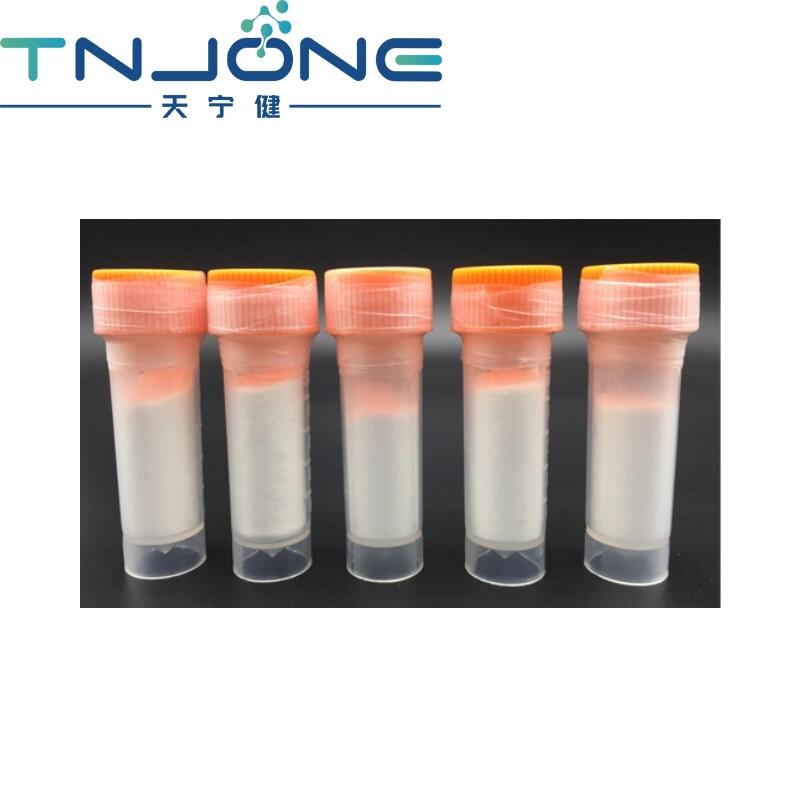-
Categories
-
Pharmaceutical Intermediates
-
Active Pharmaceutical Ingredients
-
Food Additives
- Industrial Coatings
- Agrochemicals
- Dyes and Pigments
- Surfactant
- Flavors and Fragrances
- Chemical Reagents
- Catalyst and Auxiliary
- Natural Products
- Inorganic Chemistry
-
Organic Chemistry
-
Biochemical Engineering
- Analytical Chemistry
-
Cosmetic Ingredient
- Water Treatment Chemical
-
Pharmaceutical Intermediates
Promotion
ECHEMI Mall
Wholesale
Weekly Price
Exhibition
News
-
Trade Service
The enteric nervous system is called the "second brain" of human beings.
It is composed of an extremely complex neural network, which not only controls the physiological functions of intestinal rhythm, movement and secretion, but also participates in maintaining the homeostasis of the mucosal immune system.
However, in inflammatory bowel disease (IBD), limited by technical means, the pathological changes of the enteric nervous system and their significance have not been clarified.
Professor Liu Jie, Director of the Department of Gastroenterology, Huashan Hospital, Director of the Institute of Digestive Diseases of Fudan University, and Director of the Institute of Immunophenotyping of Shanghai International Human Phenotypes Research Institute, Professor Liu Jie’s research group has long been committed to the research of neuroimmune regulation and new strategies for diagnosis and treatment.
Based on the direct interaction between the enteric nervous system and intestinal regional immunity, we are trying to explore new mechanisms of regional immune disorders in inflammatory bowel disease from a new perspective, and develop clinical intervention strategies.
On March 9th, 2021, Professor Liu Jie’s research group published a topic in PNAS online: Acetylcholine ameliorates colitis by promoting IL-10 secretion of monocytic myeloid-derived suppressor cell through nAChR/ERK pathway (the neurotransmitter acetylcholine through nAChR/ERK Promoting mononuclear myeloid-derived suppressive immune cells to secrete IL-10 to relieve enteritis).
This study revealed a new mechanism by which the cholinergic nervous system in the enteric nervous system regulates immune cell function through the cholinergic neurotransmitter acetylcholine (ACh), and then participates in the occurrence and development of inflammatory bowel disease.
The research team applied 3D immunofluorescence (iDISCO), high-throughput mass spectrometry, micro-RNAseq, deconvolution deep learning and other technologies, based on clinical samples and enteritis models, to establish an IBD enteric nerve-immune system interaction research system.
Studies have shown that there is significant cholinergic nerve damage in the intestines of IBD patients and mice with enteritis and a significant decrease in the content of the key neurotransmitter acetylcholine.
Enema administration of the neurotransmitter acetylcholine can significantly alleviate the symptoms and signs of enteritis in model mice, and increase the infiltration ratio of monocytic myeloid-derived suppressor cells (M-MDSCs) in the colonic lamina propria.
In the absence of MDSCs, the neurotransmitter acetylcholine (Ach) cannot induce remission of enteritis.
Further functional experiments confirmed that Ach can selectively act on M-MDSCs in the lamina propria of the colon to promote the expression of its anti-inflammatory factor IL-10, thereby enhancing its immunosuppressive function.
In-depth study of the mechanism found that the nAChR/MEK/ERK regulatory axis plays a key role in promoting the up-regulation of IL-10 expression by M-MDSCs.
This study revealed intestinal neuron damage and decreased neurotransmitter release in inflammatory bowel disease, and explained the direct regulation and mechanism of the intestinal local neurotransmitter acetylcholine (Ach) on the intestinal mucosal immune system, thus suggesting the local intestine The application of acetylcholine and cholinesterase antagonists is expected to enhance the anti-inflammatory function of M-MDSCs, thereby alleviating the symptoms of inflammatory bowel disease.
The research results have important scientific significance and clinical application value for the comprehensive understanding of the pathogenesis of IBD and the development of new strategies for the treatment of IBD.
Attending physician Zheng Wanwei, Ph.
D candidate Song Huan, deputy chief physician Luo Zhongguang, and attending physician Wu Hao from Huashan Hospital Affiliated to Fudan University are the co-first authors of the paper.
Professor Liu Jie, Associate Researcher Luo Feifei of Huashan Hospital Affiliated to Fudan University, and Professor Chu Yiwei of School of Basic Medicine of Fudan University are the co-corresponding authors.
Link to the paper: https:// Open for reprinting This article is open for reprinting: Just leave a message in this article and let us know
It is composed of an extremely complex neural network, which not only controls the physiological functions of intestinal rhythm, movement and secretion, but also participates in maintaining the homeostasis of the mucosal immune system.
However, in inflammatory bowel disease (IBD), limited by technical means, the pathological changes of the enteric nervous system and their significance have not been clarified.
Professor Liu Jie, Director of the Department of Gastroenterology, Huashan Hospital, Director of the Institute of Digestive Diseases of Fudan University, and Director of the Institute of Immunophenotyping of Shanghai International Human Phenotypes Research Institute, Professor Liu Jie’s research group has long been committed to the research of neuroimmune regulation and new strategies for diagnosis and treatment.
Based on the direct interaction between the enteric nervous system and intestinal regional immunity, we are trying to explore new mechanisms of regional immune disorders in inflammatory bowel disease from a new perspective, and develop clinical intervention strategies.
On March 9th, 2021, Professor Liu Jie’s research group published a topic in PNAS online: Acetylcholine ameliorates colitis by promoting IL-10 secretion of monocytic myeloid-derived suppressor cell through nAChR/ERK pathway (the neurotransmitter acetylcholine through nAChR/ERK Promoting mononuclear myeloid-derived suppressive immune cells to secrete IL-10 to relieve enteritis).
This study revealed a new mechanism by which the cholinergic nervous system in the enteric nervous system regulates immune cell function through the cholinergic neurotransmitter acetylcholine (ACh), and then participates in the occurrence and development of inflammatory bowel disease.
The research team applied 3D immunofluorescence (iDISCO), high-throughput mass spectrometry, micro-RNAseq, deconvolution deep learning and other technologies, based on clinical samples and enteritis models, to establish an IBD enteric nerve-immune system interaction research system.
Studies have shown that there is significant cholinergic nerve damage in the intestines of IBD patients and mice with enteritis and a significant decrease in the content of the key neurotransmitter acetylcholine.
Enema administration of the neurotransmitter acetylcholine can significantly alleviate the symptoms and signs of enteritis in model mice, and increase the infiltration ratio of monocytic myeloid-derived suppressor cells (M-MDSCs) in the colonic lamina propria.
In the absence of MDSCs, the neurotransmitter acetylcholine (Ach) cannot induce remission of enteritis.
Further functional experiments confirmed that Ach can selectively act on M-MDSCs in the lamina propria of the colon to promote the expression of its anti-inflammatory factor IL-10, thereby enhancing its immunosuppressive function.
In-depth study of the mechanism found that the nAChR/MEK/ERK regulatory axis plays a key role in promoting the up-regulation of IL-10 expression by M-MDSCs.
This study revealed intestinal neuron damage and decreased neurotransmitter release in inflammatory bowel disease, and explained the direct regulation and mechanism of the intestinal local neurotransmitter acetylcholine (Ach) on the intestinal mucosal immune system, thus suggesting the local intestine The application of acetylcholine and cholinesterase antagonists is expected to enhance the anti-inflammatory function of M-MDSCs, thereby alleviating the symptoms of inflammatory bowel disease.
The research results have important scientific significance and clinical application value for the comprehensive understanding of the pathogenesis of IBD and the development of new strategies for the treatment of IBD.
Attending physician Zheng Wanwei, Ph.
D candidate Song Huan, deputy chief physician Luo Zhongguang, and attending physician Wu Hao from Huashan Hospital Affiliated to Fudan University are the co-first authors of the paper.
Professor Liu Jie, Associate Researcher Luo Feifei of Huashan Hospital Affiliated to Fudan University, and Professor Chu Yiwei of School of Basic Medicine of Fudan University are the co-corresponding authors.
Link to the paper: https:// Open for reprinting This article is open for reprinting: Just leave a message in this article and let us know







